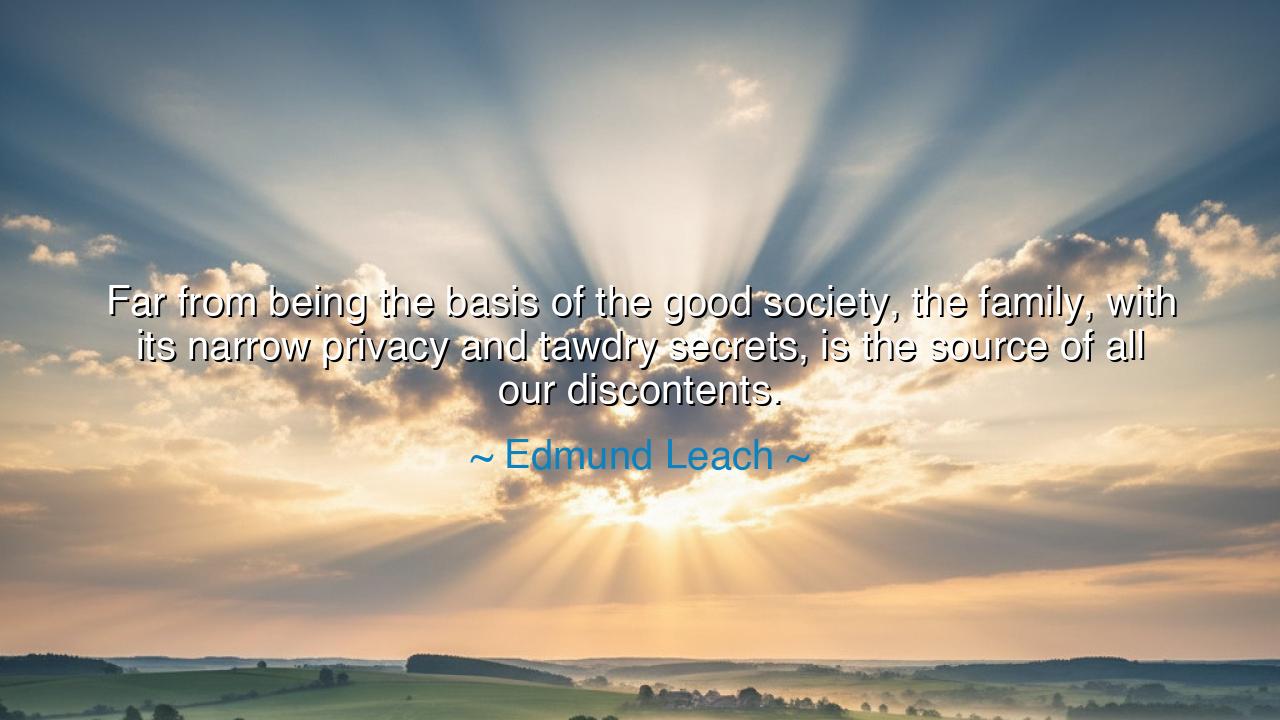
Far from being the basis of the good society, the family, with
Far from being the basis of the good society, the family, with its narrow privacy and tawdry secrets, is the source of all our discontents.






Hear the startling words of Edmund Leach, anthropologist and critic of human illusions: “Far from being the basis of the good society, the family, with its narrow privacy and tawdry secrets, is the source of all our discontents.” This is no soft proverb but a challenge hurled against one of humanity’s most sacred idols. For ages, men have praised the family as the cornerstone of order, the fountain of virtue, the sanctuary of love. Yet Leach, like a prophet unafraid to offend, tears away the veil and shows us the hidden cracks: the suffocating control, the hidden betrayals, the stifled voices that often fester within its walls.
The family, in its ideal, is meant to nurture. But in reality, Leach saw it as often breeding secrecy and hypocrisy. Behind the smiling portraits and festive gatherings, how many endure cruelty in silence? How many women and children have been bound by tradition to lives of quiet suffering, forbidden to speak of what happens in the shadows? It is in this privacy, he argued, that abuses are concealed, where inequality is rehearsed, and where the first lessons of obedience and domination are learned. From there, these lessons echo outward, shaping the greater society into a reflection of its smallest cell.
Consider the tale of the Victorian household. Outwardly, it was hailed as the model of morality—father as patriarch, mother as angel of the home, children as obedient heirs. Yet within, many homes were prisons. Women were denied voice and freedom, children were beaten into submission, and secrets of addiction, cruelty, and infidelity were hidden behind lace curtains. The secrets of these homes, guarded so fiercely, did not create stability; they produced repression and resentment, fueling literature, art, and even revolution. Thus we see that when the family is idealized beyond question, it can become a mask hiding the very forces that break harmony.
Leach’s words are not a denial of love within families, but a warning against blind worship. When we elevate the family as the sole foundation of morality, we ignore the pain it may inflict and the limitations it imposes. For not every home is a sanctuary. Some are cages, some are arenas of strife. And when society clings to the family as its unquestioned cornerstone, it risks reproducing within itself the same inequalities, silences, and repressions that dwell inside those walls. The discontents of individuals, born in the home, become the discontents of nations.
Yet there is also hope in this critique. By unveiling the false holiness of the family, Leach invites us to imagine broader foundations for the good society—community beyond blood, solidarity beyond secrecy, compassion beyond the narrow circle of kin. There are many forms of kinship, many ways of organizing human care. To honor chosen families, to strengthen networks of friendship, to build societies where no one is left to suffer in silence—this is to heal the wounds Leach exposed.
The lesson is thus twofold: first, do not sanctify what should be scrutinized; second, do not despair when the old idol is broken, for new bonds of community may rise stronger in its place. We must look honestly at the privacy of families and ask whether it protects love or conceals harm. We must look beyond the home and ask how society itself can nurture, protect, and heal, so that no individual is left captive to secrets and no community is founded on silence.
What, then, must we do? We must speak openly of what was hidden. Support those who suffer within their homes, and create structures that do not depend solely on family ties for survival—schools, communities, social systems that safeguard dignity. Value family where it brings love, but do not fear to challenge it where it breeds silence and pain. For the good society will not be built on narrow privacy or hidden secrets, but on shared truth, justice, and care that extends to all.
Thus remember: the family is not destiny. It may nurture, or it may wound. The true foundation of civilisation lies not in a single institution, but in the courage of people to care beyond themselves, to face the shadows within their homes, and to build a society where love and justice are not confined, but made universal.






AAdministratorAdministrator
Welcome, honored guests. Please leave a comment, we will respond soon